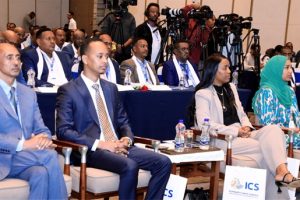
Nine months hadelapsed since the reformist Prime Minister Dr.Abiy Ahmed popped up on the political limelight of the country. The Premier has been takingmany glaring political reforms. He had givenclemency for political prisoners. He had also showed a green light to formerly terrorist tagged groups to exercise their political agendasfreely, fired corrupt and human right violators and brought them to justice. The diplomatic activitiesthe country undertook during the course of the last months were incredibly successful.
They did win international recognitions and appreciations. As a result, Prime Minister Abiy has been highly hailed by the international community for his courageous and nation-saving measures. Besides, he is reforming government structures at all levels. Among the government structures, the judiciary systemis not independent. Before the reform took shapeEthiopian courts were far from independence.
However, afterthe peaceful transfer of power, a huge improvement in ensuring judicial independence is conspicuous. How did the reform affect the judicial system of Ethiopia? How much were the judges free and fair to exercise their power? What should be done to further enhance the judiciary so as to reinforce democratic culture and freedom of expression? AbebawGetanehCommunication Affairs at Federal Justice Legal Research and Training Institute tells the Ethiopian Herald that new, highly committed and devoted leadership is being instituted.
The leadership is capable of sustaining the ongoing change through improving the judiciary system. He adds that several reforms are being implemented to create public trust and consensus towards the justice system of the country. ‘‘The public was dissatisfied regarding the impartiality of the justicesystem. They were many complaints before the reform. Now, we are working to address them and to ensure aradical change from higher courts up to Kebele levels. Besides, concerted efforts are being exerted to build the awareness of the public towards fighting wrongdoings,’’ he notes. Following our push towards this goal for over the last six months, there is encouraging improvement in ensuring a fair-and-independent judiciary system.
This would pave a way for safeguarding rule of law and right of citizens. ‘‘Over the last 27 years, people did not have trust on the judiciary. There were lots of human right violations which did not get fair justice. This has created contempt and frustration among the public that the courts couldn’t fulfill public interest.
We are working to change such attitude and we are designing legal framework that would modernize the judiciary,’’ he states. Adding ‘‘so far, the comments we are receiving indicate that we are doing a great job. But, we should have to step up our efforts until we achieve our goals.’’ As far as capacity building is concerned, judges and lawyers have been offering trainings that could enhance their ethics and professionalism, according to him.
‘‘There were problems with professional ethics of judges before nine months. The problems are related with lack of knowledge and unethical activities. The limitations are already identified and we are working to rectify them.’’ The constitution of the Federal Democratic Republic of Ethiopia (FDRE) article 79 (2) states that ‘‘courts of any level shall be free from any interference of influence of any governmental body, government official or from any other source.’’ However, what was written on the constitution was divorced from its implementation.There was a mismatch between the two before drastic political changes were ensured nine months ago.
The constitution offers huge power to the judiciary system. Yet the system was not free to safeguard the human right of citizens, Solomon Arega, Law Lecturer at Addis Ababaexplains. ‘‘An independent judiciary plays a very decisive role in realizing accountability, addressing impartiality and advocating human rights.
The constitution has given courts the power to exercise their power without interference of government or private body, though the revers proves to be true,’’ he insists. Solomon adds that to maintain the institutional independence in practice, the judiciary system which was exercised over the last 27 years was not only independent but also has not adequate finance and logistics. Thus, it has not been fulfilling its responsibilities in an effective manner.
AmanuelGetachew, a lawyer in Addis Ababa seconds Solomon’s assumption that the implementation of free, fair and independent judiciary system was nowherein place during the last 27 years., He insisted that Ethiopians were not privileged of the judiciary system over the last 27 years and due to this reasons many of them were facing material loss and being locked behind bars. ‘‘There was mockery of justice before Prime Minister Abiy came to power. There were kangaroo courts which have been giving verdict without substantial evidence and legal framework.
They have been violating basic legal procedures,’’ he says, adding: ‘‘there wasn’t strong mechanism to make them accountable when they arbitrarily give verdict. Hence, many innocent Ethiopians have been deprived justice for their violated right.’’ Even there were times that despotic officials could put words into the mouths of judges and dictate tothem what they should do and what kind of decision they should pass, he notes. Now, the wind of hope, justice, liberty and democracy is wafting across the country.
All Ethiopians are freely exercising their right without harboring fear of intimidation and detention. Moreover, the judiciary is becoming independent to safeguard human and democratic rights of citizens. Thus, the involvement of all pertinent stakeholders is called for to further consolidate the push forward in this line.
Herald FEBRUARY 3/2019
BY TSEGAY HAGOS





